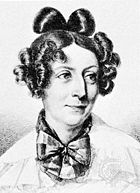
Laure Junot, duchess d'Abrantès
Encyclopedia

NEE
NEE is a political protest group whose goal was to provide an alternative for voters who are unhappy with all political parties at hand in Belgium, where voting is compulsory.The NEE party was founded in 2005 in Antwerp...
Martin de Permond; 6 November 1784 – 7 June 1838) was the wife of French general Jean-Andoche Junot
Jean-Andoche Junot
Jean-Andoche Junot, 1st Duke of Abrantès was a French general during the Revolutionary and Napoleonic Wars.-Early life:...
.
She was born at Montpellier
Montpellier
-Neighbourhoods:Since 2001, Montpellier has been divided into seven official neighbourhoods, themselves divided into sub-neighbourhoods. Each of them possesses a neighbourhood council....
, the daughter of Charles Martin de Permond and his wife Panoria, to whom during her widowhood the young Napoleon Bonaparte made an offer of marriage—such at least is the version presented by the daughter in her celebrated Memoirs. Her mother, Panoria, was descended from the Comnene
Komnenos
Komnenós or Comnenus was the name of a ruling family of the Eastern Roman Empire , who halted the political decline of the Empire from c.1081 to c.1185.-Origins:...
family, the last Greek dynasty from the Empire of Trebizond
Empire of Trebizond
The Empire of Trebizond, founded in April 1204, was one of three Byzantine successor states of the Byzantine Empire. However, the creation of the Empire of Trebizond was not directly related to the capture of Constantinople by the Fourth Crusade, rather it had broken away from the Byzantine Empire...
. The Martin de Permond family, after various vicissitudes, settled at Paris
Paris
Paris is the capital and largest city in France, situated on the river Seine, in northern France, at the heart of the Île-de-France region...
, and Bonaparte certainly frequented their house a good deal after the downfall of the Jacobin party in Thermidor
Thermidor
Thermidor was the eleventh month in the French Republican Calendar. The month was named after the French word thermal which comes from the Greek word "thermos" which means heat....
1794.
Mlle. Permond was married to Junot in 1800, early in the Consulate
French Consulate
The Consulate was the government of France between the fall of the Directory in the coup of 18 Brumaire in 1799 until the start of the Napoleonic Empire in 1804...
. She at once entered eagerly into all the gaieties of Paris, and became noted for her beauty, her caustic wit, and her extravagance. The First Consul nicknamed her petite peste, but treated her and Junot with the utmost generosity, a fact which did not restrain her sarcasms and slanders in her portrayal of him in her Memoirs. During Junot's diplomatic mission to Lisbon
Lisbon
Lisbon is the capital city and largest city of Portugal with a population of 545,245 within its administrative limits on a land area of . The urban area of Lisbon extends beyond the administrative city limits with a population of 3 million on an area of , making it the 9th most populous urban...
, his wife so displayed her prodigality, that on his return to Paris in 1806 he was burdened with debts, which his own intrigues did not lessen. She joined him again at Lisbon after he had entered that city as conqueror at the close of 1807; but even the presents and spoils won at Lisbon did not satisfy her demands; she accompanied Junot through part of the Peninsular War
Peninsular War
The Peninsular War was a war between France and the allied powers of Spain, the United Kingdom, and Portugal for control of the Iberian Peninsula during the Napoleonic Wars. The war began when French and Spanish armies crossed Spain and invaded Portugal in 1807. Then, in 1808, France turned on its...
.
On her return to France she displeased the emperor by her vivacious remarks and by receiving guests whom he disliked. The mental malady of Junot thereafter threatened her with ruin; this perhaps explains why she took some part in the intrigues for bringing back the Bourbons in 1814. She did not side with Napoleon during the Hundred Days
Hundred Days
The Hundred Days, sometimes known as the Hundred Days of Napoleon or Napoleon's Hundred Days for specificity, marked the period between Emperor Napoleon I of France's return from exile on Elba to Paris on 20 March 1815 and the second restoration of King Louis XVIII on 8 July 1815...
. After 1815 she spent most of her time at Rome amidst artistic society, which she enlivened with her sprightly converse; a monarchist on her return to Paris during the Restoration, she compiled her spirited but somewhat spiteful Memoirs with the encouragement and supervision of Balzac, her lover since 1828. The memoirs were published at Paris in 1831–1834 in 18 volumes. Many editions have since appeared.
Of her other books the most noteworthy are Histoires contemporaines (2 vols., 1835); Scènes de la vie espagnole (2 vols., 1836); Histoire des salons de Paris (6 vols., 1837–1838); Souvenirs d'une ambassade et d'un séjour en Espagne et en Portugal, de 1808 & 1811 (2 vols., 1837).
Ridiculed by Gautier
Théophile Gautier
Pierre Jules Théophile Gautier was a French poet, dramatist, novelist, journalist, art critic and literary critic....
as the "Duchess of Abracadantès" and fallen into poverty, she died in a nursing home in 1838.

